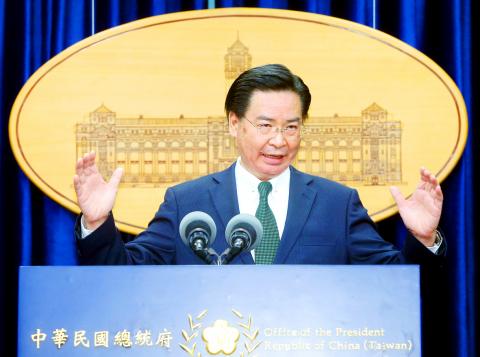President Tsai Ing-wen (蔡英文) on April 17 is to embark on a five-day trip to Swaziland, one of the nation’s two African diplomatic allies, the Ministry of Foreign Affairs said yesterday.
Minister of Foreign Affairs Joseph Wu (吳釗燮) said at a news conference at the Presidential Office that Tsai would head a delegation of officials on an official visit to the south African nation.
This year marks the 50th anniversary of Swaziland’s independence and its establishment of diplomatic relations with Taiwan, as well as the 50th birthday of Swazi King Mswati III, which makes it an ideal time to visit, Wu said.

Photo: CNA
The delegation is to travel on direct flights to and from the nation, with no stopovers, he said.
During their time in the kingdom, the officials would not only meet with Swazi officials, but would also inspect many of the medical, agricultural and educational initiatives that Taiwan has undertaken in the nation, he said.
Tsai would also meet with the overseas Taiwanese community and businesspeople in southern Africa, he added.
The announcement came two days after a Presidential Office source revealed that the visit had been planned.
While China has been investing heavily in Africa, Wu assured reporters that the nation’s diplomatic ties with Swaziland and Burkina Faso — its other ally on the continent — remain stable.
The minister said that Tsai would not visit Burkina Faso on this occasion because the nation has its own important international events to attend to and would be unable to receive the president during her time in Africa.
Burkina Faso nonetheless remains very eager for Tsai to visit, while the ministry has invited Burkinabe President Roch Marc Christian Kabore to visit Taiwan.

MORE VISITORS: The Tourism Administration said that it is seeing positive prospects in its efforts to expand the tourism market in North America and Europe Taiwan has been ranked as the cheapest place in the world to travel to this year, based on a list recommended by NerdWallet. The San Francisco-based personal finance company said that Taiwan topped the list of 16 nations it chose for budget travelers because US tourists do not need visas and travelers can easily have a good meal for less than US$10. A bus ride in Taipei costs just under US$0.50, while subway rides start at US$0.60, the firm said, adding that public transportation in Taiwan is easy to navigate. The firm also called Taiwan a “food lover’s paradise,” citing inexpensive breakfast stalls

TRADE: A mandatory declaration of origin for manufactured goods bound for the US is to take effect on May 7 to block China from exploiting Taiwan’s trade channels All products manufactured in Taiwan and exported to the US must include a signed declaration of origin starting on May 7, the Bureau of Foreign Trade announced yesterday. US President Donald Trump on April 2 imposed a 32 percent tariff on imports from Taiwan, but one week later announced a 90-day pause on its implementation. However, a universal 10 percent tariff was immediately applied to most imports from around the world. On April 12, the Trump administration further exempted computers, smartphones and semiconductors from the new tariffs. In response, President William Lai’s (賴清德) administration has introduced a series of countermeasures to support affected

CROSS-STRAIT: The vast majority of Taiwanese support maintaining the ‘status quo,’ while concern is rising about Beijing’s influence operations More than eight out of 10 Taiwanese reject Beijing’s “one country, two systems” framework for cross-strait relations, according to a survey released by the Mainland Affairs Council (MAC) on Thursday. The MAC’s latest quarterly survey found that 84.4 percent of respondents opposed Beijing’s “one country, two systems” formula for handling cross-strait relations — a figure consistent with past polling. Over the past three years, opposition to the framework has remained high, ranging from a low of 83.6 percent in April 2023 to a peak of 89.6 percent in April last year. In the most recent poll, 82.5 percent also rejected China’s

PLUGGING HOLES: The amendments would bring the legislation in line with systems found in other countries such as Japan and the US, Legislator Chen Kuan-ting said Democratic Progressive Party (DPP) Legislator Chen Kuan-ting (陳冠廷) has proposed amending national security legislation amid a spate of espionage cases. Potential gaps in security vetting procedures for personnel with access to sensitive information prompted him to propose the amendments, which would introduce changes to Article 14 of the Classified National Security Information Protection Act (國家機密保護法), Chen said yesterday. The proposal, which aims to enhance interagency vetting procedures and reduce the risk of classified information leaks, would establish a comprehensive security clearance system in Taiwan, he said. The amendment would require character and loyalty checks for civil servants and intelligence personnel prior to